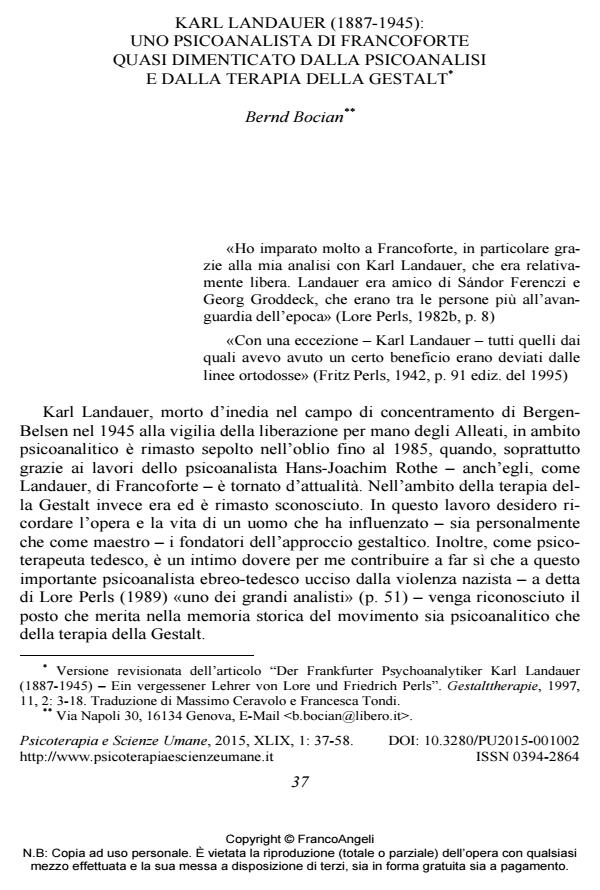Karl landauer (1887-1945): uno psicoanalista di Francoforte quasi dimenticato dalla psicoanalisi e dalla terapia della Gestalt
Titolo Rivista PSICOTERAPIA E SCIENZE UMANE
Autori/Curatori Bernd Bocian
Anno di pubblicazione 2015 Fascicolo 2015/1
Lingua Italiano Numero pagine 22 P. 37-58 Dimensione file 93 KB
DOI 10.3280/PU2015-001002
Il DOI è il codice a barre della proprietà intellettuale: per saperne di più
clicca qui
Qui sotto puoi vedere in anteprima la prima pagina di questo articolo.
Se questo articolo ti interessa, lo puoi acquistare (e scaricare in formato pdf) seguendo le facili indicazioni per acquistare il download credit. Acquista Download Credits per scaricare questo Articolo in formato PDF

FrancoAngeli è membro della Publishers International Linking Association, Inc (PILA), associazione indipendente e non profit per facilitare (attraverso i servizi tecnologici implementati da CrossRef.org) l’accesso degli studiosi ai contenuti digitali nelle pubblicazioni professionali e scientifiche.
Viene reso omaggio al quasi dimenticato psicoanalista di Francoforte Karl Landauer (1887-1945), morto nel campo di concentramento di Bergen-Belsen. Landauer era stato paziente e allievo diretto di Freud, collaboratore e amico di Max Horkheimer, uno dei analisti di Lore e Fritz Perls e un pensatore critico e indipendente. Dopo un’introduzione sulla sua biografia e sulla fondazione dell’Istituto psicoanalitico di Francoforte, vengono presi in esame alcuni temi del suo lavoro che hanno anticipato aspetti della psicoanalisi contemporanea ed esercitato una influenza sulla terapia della Gestalt. Tra queste tematiche vi sono la sua applicazione morbida della psicoanalisi attiva, l’enfasi sul pensare e sul sentire in modo indipendente, la sua particolare attenzione agli affetti e al linguaggio del corpo (anticipando temi dell’infant research) e un interesse per i fattori sociali.
Parole chiave:Karl Landauer, storia della psicoanalisi, terapia della Gestalt, Fritz Perls, Lore Perls
- Dalla libera associazione alla concentrazione: la consapevolezza, le "fantasie forzate" di Ferenczi e "il terzo" in terapia della Gestalt Bernd Bocian, in QUADERNI DI GESTALT 2/2015 pp.121
DOI: 10.3280/GEST2014-002008 - La prospettiva di campo nella psicopatologia e nella psicoterapia della Gestalt contemporanea Gianni Francesetti, in PSICOTERAPIA E SCIENZE UMANE 2/2021 pp.227
DOI: 10.3280/PU2021-002003
Bernd Bocian, Karl landauer (1887-1945): uno psicoanalista di Francoforte quasi dimenticato dalla psicoanalisi e dalla terapia della Gestalt in "PSICOTERAPIA E SCIENZE UMANE" 1/2015, pp 37-58, DOI: 10.3280/PU2015-001002